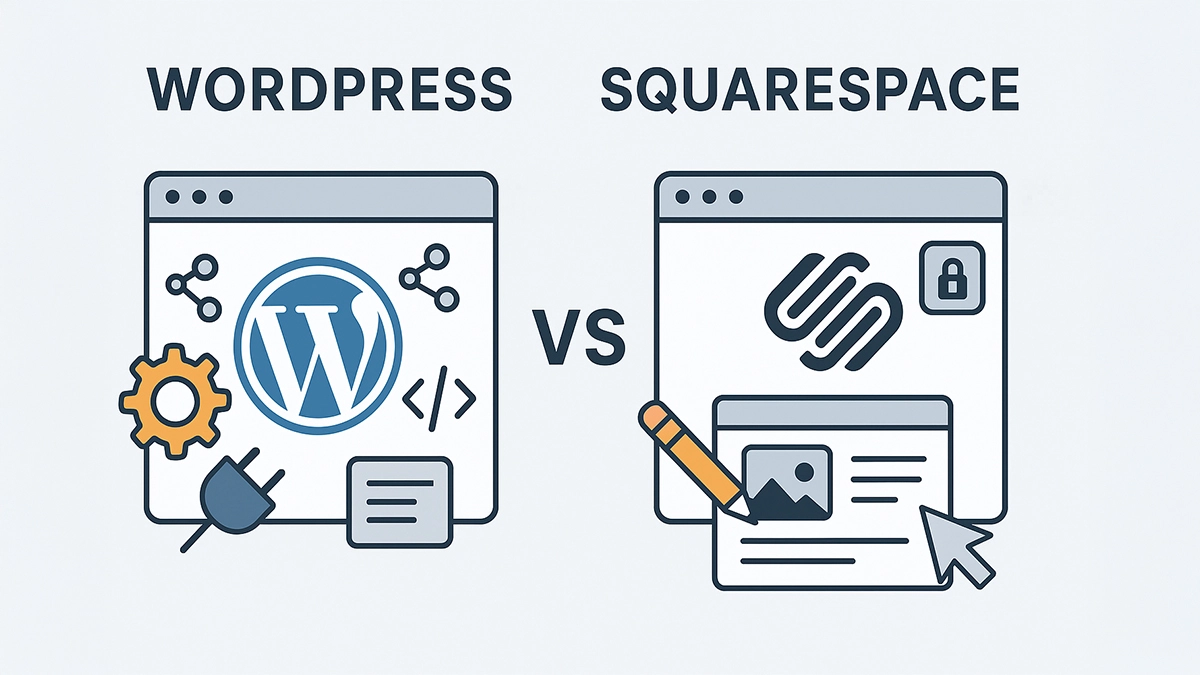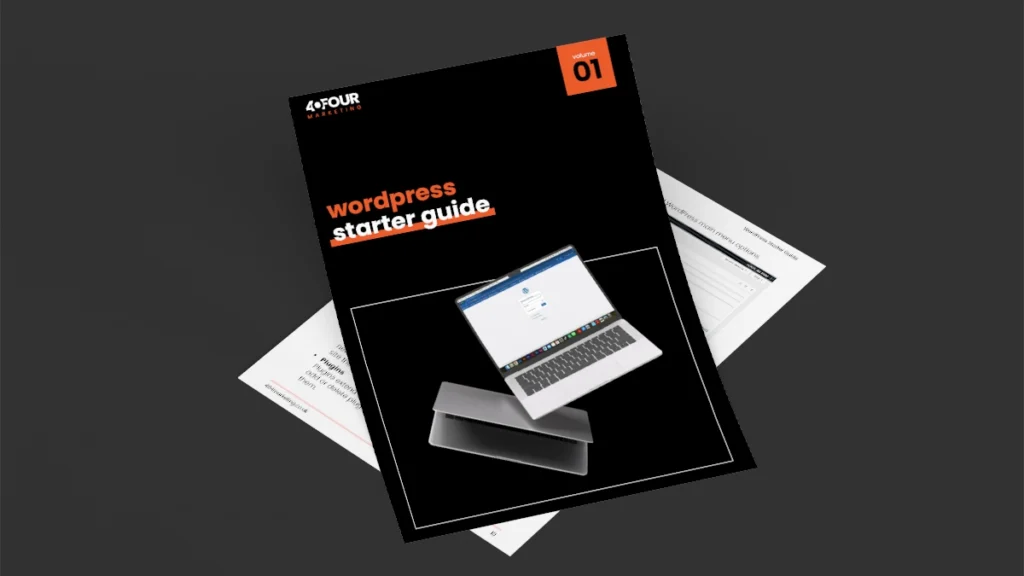If you’re starting a new business, one of the first things you’ll need is a website. For many small businesses and startups, the choice often comes down to WordPress vs Squarespace. Both are widely used platforms, but they work in very different ways.
In this guide, we’ll dive deep into WordPress vs Squarespace, looking at ease of use, cost, design flexibility, SEO, e-commerce, and more. By the end, you’ll have a clear understanding of which option is better for your business.
Why Your Website Platform Choice Matters
Your website is your digital shopfront. It’s often the first impression potential customers have of your business. A clunky, slow, or restrictive platform can hold you back. On the other hand, the right platform will support your growth and give you the tools you need to compete online.
That’s why the debate of WordPress vs Squarespace is so important. Let’s take a closer look at each platform.
| Criteria | Winner |
|---|---|
| Ease of use | Squarespace |
| Design & flexibility | WordPress |
| Features & plugins | WordPress |
| SEO capabilities | WordPress |
| E-Commerce | WordPress |
| Pricing | Tie |
| Ownership and Control | WordPress |
| Security | Wix |
| Support | Wix |
| Scalability | WordPress |
What Is WordPress?
WordPress is the world’s most popular content management system (CMS), powering over 40% of all websites. There are two versions:
- WordPress.org – Free, open-source software that you install on your own hosting. This is the version we’re comparing here.
- WordPress.com – A hosted service with fewer customisation options.
With WordPress.org, you get full control over your website, from design to functionality. It’s highly flexible and suitable for everything from small business sites to complex e-commerce stores.
read more
WordPress starter guide
What Is Squarespace?

Squarespace is a hosted website builder that focuses on design and ease of use. Everything is included: hosting, templates, and security. You simply sign up, choose a template, and customise your site with a drag-and-drop editor.
Squarespace is particularly popular with creatives and small businesses that want stylish websites without needing technical skills.
WordPress vs Squarespace: Ease of Use
When it comes to ease of use, Squarespace is often seen as the simpler option.
- Squarespace:
Designed to be beginner-friendly. You pick a template and start editing straight away. No need for coding or technical setup. - WordPress:
Requires a bit more effort at the start. You need to set up hosting, install the software, and choose a theme. However, once you’re up and running, the WordPress editor (especially with page builders like Elementor or Gutenberg) is straightforward.
Winner: Squarespace for simplicity. But if you’re willing to learn, WordPress offers far more flexibility.
WordPress vs Squarespace: Design and Flexibility
Your website design reflects your brand, so flexibility is key.
- Squarespace:
Known for its stunning templates. They’re sleek, modern, and mobile-responsive. However, customisation is limited – you can change layouts, fonts, and colours, but you’re restricted to what the platform allows. - WordPress: Offers thousands of free and premium themes. You can customise everything – from layouts and colours to functionality. Plus, you can switch themes whenever you like.
Winner: WordPress if you want complete creative freedom. Squarespace is great for stylish but more limited websites.
WordPress vs Squarespace: Features and Plugins
The features you need will depend on your business. For instance, imagine the owner of a small café who initially set up a simple website through Squarespace. As the café grew popular, the owner realized that managing walk-in traffic was becoming challenging. They decided to add a reservation system to streamline operations. With Squarespace’s built-in tools, they found it easy to start taking online reservations without any complex setup. However, had they needed more advanced features or integration with other systems, they might have faced limitations on this platform. This illustrates how the right platform can address specific business needs efficiently.
- Squarespace:
Comes with built-in tools for blogging, portfolios, e-commerce, and email marketing. You don’t need to worry about installing add-ons. However, if you need something outside of what Squarespace provides, you may hit a wall. - WordPress:
Offers over 60,000 plugins. From SEO to booking systems, you can add virtually any feature. This makes it much more versatile, especially for growing businesses.
Winner: WordPress for versatility. Squarespace works well for simpler needs.
WordPress vs Squarespace: SEO Capabilities
Search engine optimisation (SEO) is crucial if you want people to find your business online.
- Squarespace:
Includes basic SEO features such as meta titles, descriptions, and mobile optimisation. It’s fine for small businesses with local reach, but advanced SEO strategies are harder to implement. For example, studies have shown that Squarespace sites can load 0.8 seconds slower on average compared to sites built with more SEO-optimised platforms. This slower load time can impact search rankings, making advanced SEO tasks like keyword targeting more challenging. - WordPress:
Built with SEO in mind. With plugins like Yoast SEO or Rank Math, you can control every detail. WordPress also integrates well with fast hosting and advanced site structures.
Winner: WordPress for businesses serious about ranking on Google.
WordPress vs Squarespace: E-Commerce
If you plan to sell online, e-commerce functionality is a must.
- Squarespace:
E-commerce tools are included on higher-tier plans. They’re easy to set up and work well for smaller catalogues. However, payment options and customisation are limited. - WordPress:
With WooCommerce, you can build a highly customisable online shop. It supports multiple payment gateways, shipping options, and advanced features like subscriptions or memberships.
Winner: WordPress for e-commerce growth. Squarespace is best for smaller stores.
WordPress vs Squarespace: Pricing
Cost is always a factor for small businesses.
- Squarespace:
Plans start at around £10/month. Business and e-commerce plans cost more, usually £15 – £25/month. The advantage is predictable pricing. - WordPress:
The software itself is free, but you’ll need to pay for hosting (£5 – £20/month), a domain, and potentially themes or plugins. Costs can vary but can also be tailored to your budget.
Winner: Tie – Squarespace for predictability, WordPress for long-term value.
WordPress vs Squarespace: Ownership and Control

Ownership of your website is critical for long-term security.
- Squarespace:
Your site is hosted on Squarespace’s servers. If you want to move it elsewhere, you’re limited. - WordPress:
You fully own your site and data. You can switch hosting providers at any time.
Winner: WordPress for full ownership and control.
WordPress vs Squarespace: Security
Security is essential for protecting your website and customer data.
- Squarespace:
Handles all security, updates, and SSL certificates. This is ideal if you don’t want to manage technical tasks. - WordPress:
You’re responsible for updates and backups. However, with managed hosting and security plugins, you can achieve very high levels of protection.
Winner: Squarespace for beginners. WordPress requires more management, but it can be more secure with the right setup.
WordPress vs Squarespace: Support
If you run into problems, support is key.
- Squarespace:
Offers 24/7 support via live chat and email. - WordPress:
Support depends on your hosting provider and the wider community. Premium themes and plugins often come with dedicated support too.
Winner: Squarespace for direct, centralised support. WordPress relies more on self-help and community resources.
WordPress vs Squarespace: Scalability
As your business grows, your website must keep up.
- Squarespace:
Perfect for small to medium-sized websites, but less suitable for highly customised or large-scale projects. - WordPress:
Scales easily. From small blogs to international e-commerce stores, WordPress can grow with you. Furthermore, the global contributor network of WordPress, consisting of over 60,000 developers, ensures that no matter how complex your future needs become, solutions and innovations are always readily available. This not only reassures scalability on a technical front but also provides a supportive community to help navigate challenges.
Winner: WordPress for long-term scalability.
Pros and Cons of WordPress vs Squarespace
To make things clear, here’s a quick summary.
Squarespace
| Squarespace Pros | Squarespace Cons |
|---|---|
| Stylish templates | Limited flexibility |
| All-in-one solution | Less suitable for advanced SEO or e-commerce |
| Easy to use | You don’t own the platform |
| 24/7 support |
WordPress
| WordPress Pros | WordPress Cons |
|---|---|
| Full ownership and control | Steeper learning curve |
| Thousands of themes and plugins | Maintenance is your responsibility |
| Great for SEO and scalability | Support isn’t centralised |
| Highly customisable |
Looking to get your business online?
Check out our web design services
So, WordPress vs Squarespace: Which Should You Choose?
If you want a stylish, beginner-friendly website without dealing with technical details, Squarespace is a great option. It’s simple, secure, and perfect for smaller businesses or creatives.
However, if you want full control, advanced SEO, and a platform that grows with your business, WordPress is the clear winner. It may take more effort at the start, but it offers far more in the long run.
Final Thoughts
When it comes to WordPress vs Squarespace, the best choice depends on your goals. For simplicity and design, go with Squarespace. For flexibility and growth, go with WordPress.
At 404 Marketing, we help small businesses and startups build websites that don’t just look great – they generate results. Whether you’re unsure which platform to choose or you’re ready to launch a professional website, we’re here to help.
Your website is the foundation of your online presence. Make sure it’s built on the right platform for your future.


